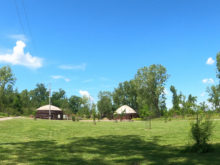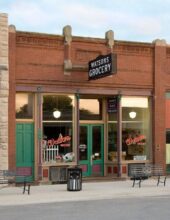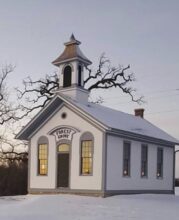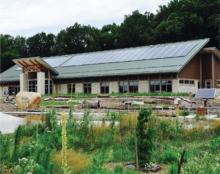Congratulations 2023 Site of the Year!
Gilbertson Recreation Education Area
About People’s Choice Site of the Year
Each year, Silos & Smokestacks National Heritage Area (SSNHA) celebrates the best in heritage development by presenting the “People’s Choice Site of the Year”. Voted on by the public, this special honor is presented to only one deserving SSNHA Partner Site.
Voting for the 2024 Site of the Year will be open to the public at www.silosandsmokestacks.org from Oct. 21-25. The top three finalists as of Oct. 25 will be invited as our guests to the Heritage Site Annual Training on Nov. 14, where the winner will be announced and receive the traveling award for People’s Choice “Site of the Year.”
Check back for 2024 Nominees.
congratulations 2023 Site of the Year Nominees
 |
As one of the original designated Silos and Smokestacks National Heritage Area sites, the Fossil & Prairie Park Preserve has been sharing their agricultural connection of the story of the Rockford Brick & Tile Company. This company was well known in northeastern Iowa as the chosen source of drainage tile and bricks until the mid-1970’s. Although the Fossil & Prairie Park Preserve may be best known for the Devonian fossils that can be collected there, it is the Rockford Brick & Tile Co. that can be credited for their discovery. Staff have worked to maintain the historic site including the original beehive kilns and share the stories of the employees through interpretative signage and displays. This past year, a Summer Festival was held at the kiln site for participants to eat in the kilns.
Since opening the Fossil & Prairie Center in 2001, the area welcomes 5,000 visitors annually. Volunteers welcome visitors and share their knowledge throughout the tourism season. The Fossil & Prairie Center contains exhibits on the history of the Rockford Brick & Tile Company as well as on the Devonian fossils, Iowa’s native prairie and Backyard wildlife. Many schools travel to the park as a destination field trip location. The fossils they collect provide a hands-on story of Iowa historical past, 365 million years ago to the Devonian period. During the year the Fossil & Prairie Park Preserve is host to many events offered by both Floyd County Conservation and the Fossil & Prairie |
 |
State Center has a lot to be proud of. We have four museum locations including a one room school house, a late 1800 train depot, Sheppler’s Barbershop and Watson’s Grocery Store. Watson’s is a turn of the century grocery store that our community restored and turned into the hub of our community’s events.
We host community celebrations such as the Rose Festival, Watson’s Fall Festival and Christmas On Main. We are open for special events such as RAGBRAI and group/class tours. We are open each weekend from Memorial Day until Labor Day. We continue to make significant improvements to our building while hosting hundreds of local residents and guests. At the Fall Festival we host a pumpkin decorating contest, caramel apples and Florence Watson’s adult punch. Christmas On Main is a community wide event that is warmly received each year. Hundreds of children visit Santa and Mrs. Claus who arrive on a horse drawn trolly. Generations of families have taken their family holiday photo each year with Santa. For example, in September, fifty first graders toured our museum and now they are making Christmas decorations with their photos on them to decorate the tree in Santa’s photo backdrop. We believe if they are involved as children they will return as adults. We are known for our welcoming spirit. |
 |
The tireless efforts to restore this 1873 one-room schoolhouse has resulted in a fabulous heritage site that visitors can enjoy during summer months and by appointment. Re-enactments with homeschool groups, private schools, public schools are receiving phenomenal reviews from parents, children, and teachers alike. A 10-minute Emmy award-winning film that features former students and teachers of Forest Grove No 5 is a highlight of the visitor experience. Children who visit are engaged in activities, including reciting the 1920 version of the Pledge of Allegiance, listening to the Victrola, ringing the bell, and finding similarities and differences in the one room school compared to a present day school. When children of multiple ages are visiting, the children are enlightened with stories of former students of different ages who learned together in one classroom. Re-enactments include an entire day in the schoolhouse. They enter with the ringing of the bell. They write with a pen/nib and ink from old ink bottles while sitting at period desks. Younger students use slates and chalk. Children are called to the recitation bench by age group to learn 1920’s math, reading, and history lessons. They eat lunch from period lunch pails and play period games for recess. The goal is to give visitors of all ages an authentic one-room school experience, and Forest Grove No 5 checks all the boxes!
|
 |
Founded in 1973 as an independent, nonprofit organization, Indian Creek Nature Center (ICNC) has been the leader in providing environmental education programs, outdoor recreation and land restoration for all residents and visitors to Cedar Rapids and the surrounding area.
For the past 50 years, ICNC has become an important fixture in the community. ICNC’s trails through the prairie, woodlands, and wetlands are designed to provide time in nature. The organization’s programs — specifically those for young people like our nature-based preschool program — strive to create a connection to nature that will last a lifetime. Special events, like the annual Maple Syrup Festival and farm-to-table dinners, are designed to celebrate the bounties of the land and on our connection to it. The organization, particularly through the Amazing Space campus–a Living Building Challenge Petal Certified facility–is an example of increasing sustainable living. ICNC also manages a 190-acre farm where it carries out its mission by establishing sustainable, economically viable regenerative, organic farming practices. ICNC’s commitment is to live up to its history of innovation, unique partnerships, and environmental education and recreation for the community and beyond. While doing this, ICNC adds to the vibrancy of its community with the depth and breadth of programming, projects and initiatives that, combined, make our world a better, healthier place for current and future generations. |
 |
More commonly known as Gilbertson Park, this SSNHA partner site offers a multitude of educational and recreational activities for visitors of all ages. Visitors can explore the nature center and experience a live beehive, turtles, snakes, and educational games. A certified natural playscape is located just outside, where kids and adults alike can play music, crawl through a log, create sidewalk art, and dig up a dinosaur! A short walk will lead to the Mavis and Conner Dummermuth Historical Building to see a collection of farm and pioneer equipment and memorabilia and then to the Hart Dummermuth Historical House to see what life was like “back in the day.” Across the road is a timber sawmill, reconstructed to tell the story of the timber industry in Iowa. The Avenue of Flags depicts all 50 states and military branches. Nearby, visitors can walk along natural trails, find the petting zoo, and have a picnic. The concrete Turkey River Recreational Corridor Trail is available for walkers and bicyclists, leading to the campground. Visitors can then continue on foot or on horseback on the 10+ miles of nature trails. Paddlers can practice their skills on the pond with the kayak launch or walk out on the dock to catch some fish. Once they perfect their skills, they can paddle the state-designated Turkey River Water Trail. Just across the river, visitors can walk or bike across the lighted pedestrian bridge into the small community of Elgin, known as the “Little Switzerland of Iowa.” |
Related Attractions:

Fossil & Prairie Park Preserve & Center
1227 215th Street
Rockford, Iowa
641-756-3490








